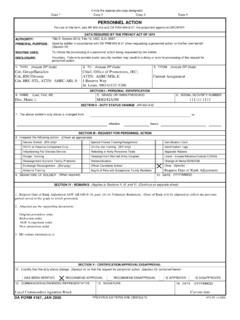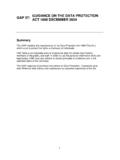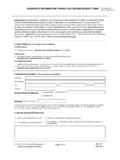Transcription of Privacy Act of 1974 - ASAP
1 Privacy Act of 1974 : A Basic Overview Cindy Allard, Department of Defense Timothy Graham, Department of Veterans Affairs PURPOSE OF THE Privacy ACT. To regulate the collection, maintenance, use, and dissemination of personal information held by the Executive Branch of Government Been in effect since Sep 27, 1975. That's over 36 years! Public Law 93. 93--579. Codified as 5 552a CONGRESS' GOAL. To curb the illegal surveillance and investigation of individuals by federal agencies that was exposed during the Watergate scandal Concerned with potential abuses presented by the Government's increasing use of computers to store and retrieve personal data by means of a universal identifier 1.
2 Basic Policy Objectives of the Privacy Act To restrict disclosure of personally identifiable records maintained by Executive branch agencies To grant individuals increased rights of access to agency records maintained on themselves To grant individuals the right to seek amendment of agency records that are not accurate, relevant, timely, or complete To establish a code of "fair information practices . which regulates the collection, use, maintenance and disclosure of personally identifiable information Key Definitions Why are definitions important?
3 The Privacy Act is a technical statute and the definitions can bring an agency in or out of the reach of the statute. Who has to comply with the Privacy Act? Who can use the Privacy Act? What does the Privacy Act apply to? Who has to comply? An Agency Agency Adopts the FOIA definition Agencies under the Federal Executive Branch Section 7 applies to state and local agencies Unlawful for any Federal, state, or local agency to deny a right, benefit or privilege because an individual refuses to provide a SSN. Any Federal, state or local agency requesting an SSN must inform: if disclosure is mandatory or voluntary; by what statute or authority; and the uses 2.
4 Who can use the Privacy Act? An Individual An individual United States citizens or an alien lawfully admitted for permanent residence Deceased individuals are not covered FOIA may protect next of kin Corporations and organizations not covered FOIA may protect sole proprietors Government Contractors Subsection (m) makes provisions of the Act binding on contractors who operate a system of record to accomplish an agency function For the purposes of criminal penalties, subsection (m) contractors are considered agency employees What does the Privacy Act Pertain to?
5 Records in a System of Records Privacy Act protects information on individuals that is in a system system of records . records . This is any group of records from which information is retrieved by the name of an individual or by some other identifying particular assigned to the individual Must identify the individual Must be retrieved by an identifier Excludes purely personal notes supervisory notes (memory refreshers). 3. Retrieved vs. Retrievable OMB guidelines explain that a system of records exists if: (1) There is an indexing or retrieval capability using identifying particulars built into the system system, and (2) The agency does in fact retrieve records about individuals by references to some personal identifier Henke v.
6 Department of Commerce, 83 F. 3d 1453 ( Cir. 1996), capability to retrieve is not sufficient System of Records Notice Requirements: Must Publish a System of Records Notice in the Federal Register. 5 USC 552a(e)(4). Why is this important? Most of the rights and requirements of the Privacy Act depend on whether the definition is met. No Disclosure Without Consent General Rule - NO disclosure unless you have: (1) Written request from the subject or (2) P. Prior i written itt consentt ffrom th the subject bj t authorizing a 3rd party to gain access (3) One of the 12 Exceptions established in 5.
7 552a(b). 4. Accounting of Certain Disclosure Each agency must maintain an accounting of disclosures from a system of record except when disclosure are made under: ((b)(1). )( ). (b)(2). Agencies must make the accounting available to the subject except for those made under (b)(7). Individual Rights Access rights Amendment rights Private right of actions for violations Criminal and civil penalties 10 Exemptions 1. (d)(5) exempts information compiled in the reasonable anticipation of a civil action or proceeding from the access provisions of the Privacy Act Act.
8 Most similar to attorney work product Not limited to purely judicial proceedings, but also covers administrative hearings 5. Exemptions (cont.). 2. (j)(1) information maintained by the CIA. 3. (j)(2) information maintained by a principal function criminal law enforcement g agency y and compiled p for a criminal law enforcement purpose Threshold question Is the agency a criminal law enforcement agency? Once threshold is met was the information compiled for a criminal law enforcement purpose? Exemptions (cont.). 4. (k)(1) classified information 5.
9 (k)(2) investigatory material compiled for law enforcement purposes, other than material within the scope of (j)(2). 2 elements 1. Is the material investigatory not covered by (j)(2). 2. Was an individual denied a right, privilege, or benefit as a result of the maintenance of the record? Exemptions (cont.). 6. (k)(3) maintained in connection with providing protective services for the President of the United States or other individuals 7. (k)(4) required by statute to be maintained and used solelyy as a statistical record 8. (k)(5) information that reveals a source who was provided an express promise of confidentiality in the context of background investigation materials Includes determinations for Federal civilian employment, military service, Federal contracts or access to classified records 6.
10 Exemptions (cont.). 9. (k)(6) testing materials used solely to determine an individuals qualifications for appointment or promotions in the Federal service Disclosure would compromise the objectivity or fairness of the examination process Typically exempt under FOIA (b)(2). 10. (k)(7) evaluation materials used to determine potential for promotion in the military Only in instances where disclosure would reveal the identity of a confidential source Agency Requirements Maintain only relevant and necessary information Collect information directly from the source At the time of collection disclose: authority, principle purpose for collection, how records will be used and di l d and disclosed, d th ff t if any, off nott providing the effects, idi ththe information.




